Post-stent chest pain, revisited
Heart Sisters
JULY 28, 2024
Heart patients with persistent or recurrent post-stent chest pain present “an unmet clinical need”, according to the European Journal of Cardiology.
This site uses cookies to improve your experience. By viewing our content, you are accepting the use of cookies. To help us insure we adhere to various privacy regulations, please select your country/region of residence. If you do not select a country we will assume you are from the United States. View our privacy policy and terms of use.
 Chest Pain Related Topics
Chest Pain Related Topics 
Heart Sisters
JULY 28, 2024
Heart patients with persistent or recurrent post-stent chest pain present “an unmet clinical need”, according to the European Journal of Cardiology.
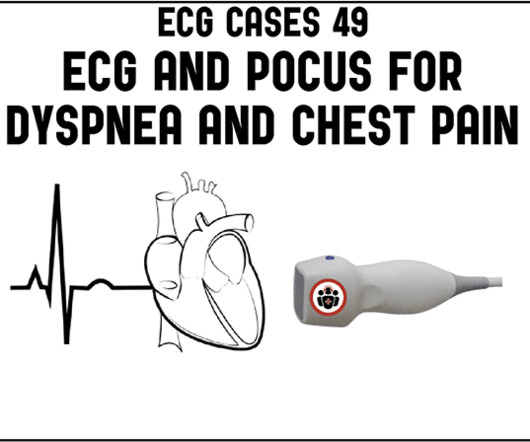
ECG Cases
APRIL 2, 2024
In this ECG Cases blog, Jesse McLaren and Rajiv Thavanathan explore how ECG and POCUS complement each other for patients presenting to the emergency department with shortness of breath or chest pain. The post ECG Cases 49 – ECG and POCUS for Dyspnea and Chest Pain appeared first on Emergency Medicine Cases.

Dr. Smith's ECG Blog
OCTOBER 3, 2024
I assumed it was a patient with acute chest pain. It was a man in his 30s with chest pain. This was sent to me from Sam Ghali ( @EM_Resus ) with no other information. What do you think, Steve? Real or just fake?" What do YOU think? It has some inferior ST elevation with some reciprocal ST depression and inverted T in aVL.
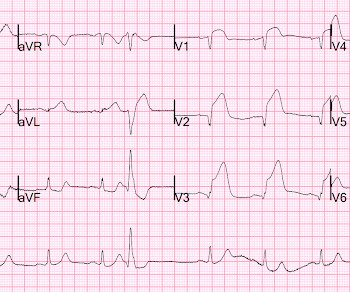
Dr. Smith's ECG Blog
SEPTEMBER 26, 2023
2 middle aged males presented with chest pain. Which had the more severe chest pain at the time of the ECG? Patient 2 at the bottom with a very subtle OMI complained of 10/10 chest pain at the time the ECG was recorded. 414 patients were included in the analysis.

Dr. Smith's ECG Blog
JUNE 7, 2024
Written by Jesse McLaren A 45-year-old presented with 24 hours of intermittent chest pain. On it’s own this is nonspecific, but in the right context this could be diagonal occlusion (if active chest pain) or infero-posterior reperfusion (if resolved chest pain). #2 Can you guess the sequence?

Dr. Smith's ECG Blog
OCTOBER 17, 2024
Written by Jesse McLaren Two patients in their 70s presented to the ED with chest pain and RBBB. Patient 1 : a 75 year old called paramedics with one day of left shoulder pain which migrated to the central chest, which was worse with deep breaths. Do either, both, or neither have occlusion MI? Vitals were normal.
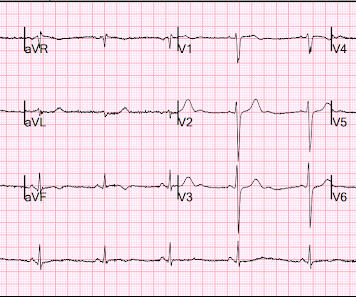
Dr. Smith's ECG Blog
SEPTEMBER 3, 2023
This was sent by anonymous The patient is a 55-year-old male who presented to the emergency department after approximately 3 to 4 days of intermittent central boring chest pain initially responsive to nitroglycerin, but is now more constant and not responsive to nitroglycerin. It is unknown when this pain recurred and became constant.

American College of Cardiology
MARCH 25, 2024
What is the validity the American College of Cardiology Expert Consensus Decision Pathway (ACC Pathway) for chest pain in a multisite US cohort?

Dr. Smith's ECG Blog
MAY 29, 2024
Written by Pendell Meyers Two patients with acute chest pain. Patient 1: Patient 2: Patient 1: A man in his 40s with minimal medical history presented with acute chest pain radiating to his R shoulder. Two patients with chest pain. Do either, neither, or both have OMI and need reperfusion?

Dr. Smith's ECG Blog
MAY 27, 2024
Written by Jesse McLaren, with a very few edits by Smith A 60-year-old presented with chest pain. Inferior hyperacute T waves, which have been added to the 2022 ACC consensus on chest pain as a “STEMI equivalent”[3] 3. But are there any other signs of Occlusion MI? Conduction disorders in the setting of acute STEMI.

Med Page Today
MAY 23, 2024
(MedPage Today) -- For lower-risk patients with acute myocardial injury already ruled out for their chest pain, an increase in referrals for noninvasive cardiac testing (NICT) was not associated with improved outcomes, a retrospective cohort study.

Medical Xpress - Cardiology
MARCH 29, 2024
Future heart attacks could be better prevented in people visiting their GP with unexplained chest pain, after Keele researchers developed the clearest picture yet of the factors that put them at higher risk. The research is published in the European Journal of Preventive Cardiology.
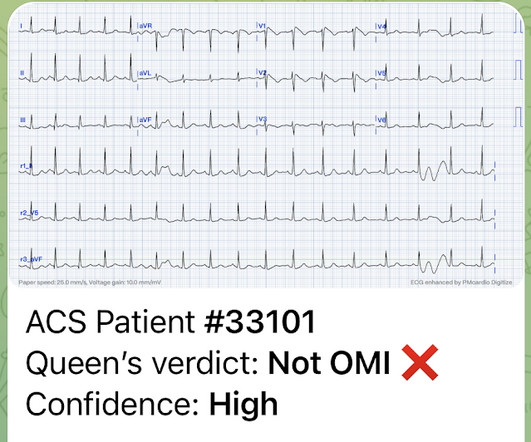
Dr. Smith's ECG Blog
APRIL 6, 2024
A young woman presented with acute chest pain. This case came from a friend whose sister was the patient. She knew I was interested in ECGs, so she took a photo of this one. This was her presenting ECG: What do you think? This is clearly Brugada phenotype. There is downsloping ST Elevation in V1 and V2.
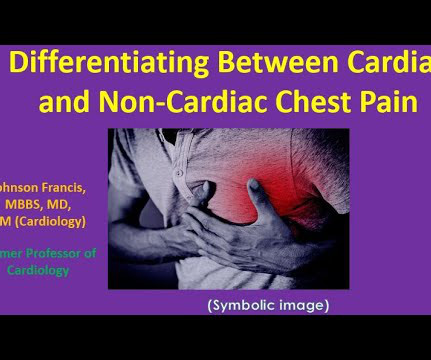
All About Cardiovascular System and Disorders
APRIL 10, 2024
It is not always possible to be certain about the origin of chest pain just by its characteristics as the variation between individuals is quite a bit. A medical opinion should be sought in case of any significant chest pain so that important ailment is not missed. A pain lasting more than 30 minutes is usual.

Med Page Today
MAY 19, 2024
(MedPage Today) -- PARIS -- Whether a person had chest pains resolved by angioplasty hinged on the nature, not the severity, of their presenting symptoms, an ORBITA-2 analysis showed. Investigators found two groups more likely to benefit from.

Frontiers in Cardiovascular Medicine
OCTOBER 8, 2024
ObjectiveAlthough the association between admission glucose (AG) and major adverse cardiac events (MACE) is well-documented, its relationship with 30-day MACE in patients presenting with cardiac chest pain remains unclarified.
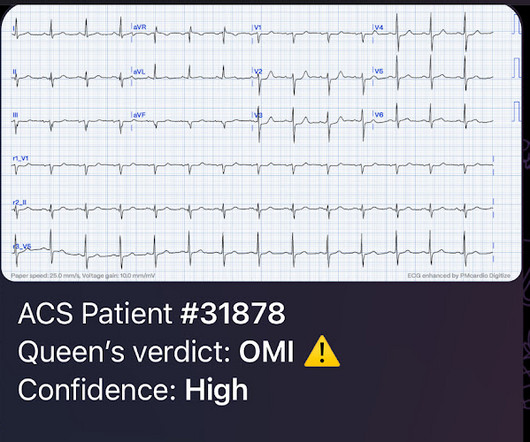
Dr. Smith's ECG Blog
MARCH 31, 2024
The patient was a middle-aged female who had acute chest pain of approximately 6 hours duration. The pain was still active at the time of evaluation. See some relevant cases below: Chest pain with anterior ST depression: look what happens if you use posterior leads.

Dr. Smith's ECG Blog
SEPTEMBER 12, 2024
Written by Pendell Meyers A man in his 40s called EMS for acute chest pain that awoke him from sleep, along with nausea and shortness of breath. His history included known heart failure with prior EF 18%, insulin dependent diabetes, and polysubstance abuse. Vitals were within normal limits except for tachypnea.

Dr. Smith's ECG Blog
AUGUST 9, 2024
Written by Colin Jenkins and Nhu-Nguyen Le with edits by Willy Frick and by Smith A 46-year-old male presented to the emergency department with 2 days of heavy substernal chest pain and nausea. The patient continued having chest pain. These diagnoses were not found in his medical records nor even a baseline ECG.

JAMA Cardiology
FEBRUARY 27, 2024
This prespecified secondary analysis of the Diagnostic Imaging Strategies for Patients With Stable Chest Pain and Intermediate Risk of Coronary Artery Disease (DISCHARGE) randomized clinical trial investigates the association of age with clinical outcomes after computed tomography and coronary angiography in stable chest pain.
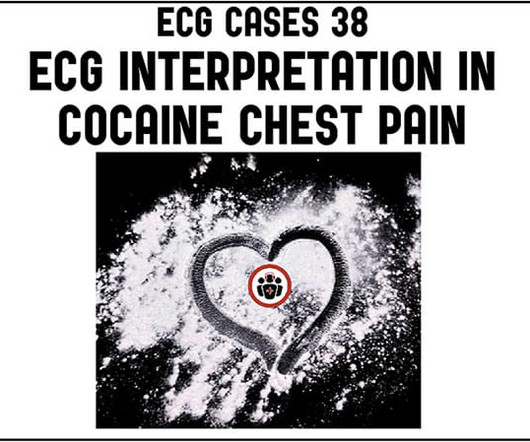
ECG Cases
DECEMBER 20, 2022
Jesse McLaren discusses some key aspects of cocaine chest pain ECG interpretation in this month's blog including: Patients with cocaine-associated chest pain require benzodiazepines +/- nitroglycerine for symptom relief, aspirin and ECG to look for signs of occlusion and reperfusion.

Dr. Smith's ECG Blog
AUGUST 11, 2024
Written by Jesse McLaren A healthy 75 year old developed 7/10 chest pain associated with diaphoresis and nausea, which began on exertion but persisted. Below is the first ECG recorded by paramedics after 2 hours of chest pain, interpreted by the machine as “possible inferior ischemia”. What do you think?
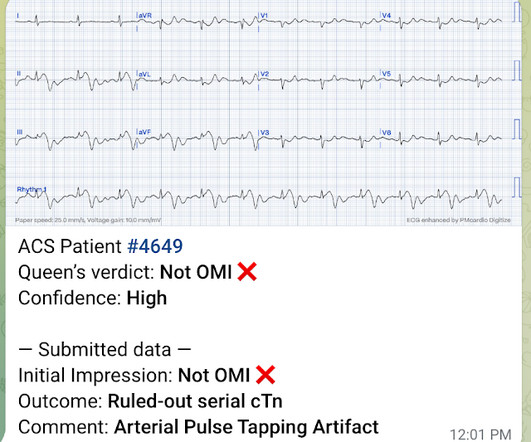
Dr. Smith's ECG Blog
SEPTEMBER 15, 2023
Of course he said: "Yes, it was a 60 year old diabetic with Chest pain." K en G rauer gives a thorough explanation here: A 60 year old with chest pain == MY Comment , by K EN G RAUER, MD ( 9/15 /2023 ): == The 1st time that I saw APTA ( A rterial P ulse T ap A rtifact ) — I did not know what it was. That is not a STEMI.

Dr. Smith's ECG Blog
AUGUST 16, 2024
Written by Pendell Meyers A man in his 60s presented with acute chest pain and normal vital signs. Here is his triage ECG: What do you think? The ECG shows massively hyperacute T waves of LAD OMI, plus WPW. V3-V5 also have the depressed HATW takeoff which qualifies them as the rare de Winter subtype of HATWs.

Dr. Smith's ECG Blog
SEPTEMBER 25, 2024
A healthy 45-year-old female presented with chest pain, with normal vitals. The patient was previously healthy, with no atherosclerotic risk factors, and developed chest pain after an episode of stress. The pain was crushing retrosternal, radiated to the arms and was associated with lightheadedness.

Dr. Smith's ECG Blog
MARCH 13, 2024
Written by Willy Frick A man in his early 40s with BMI 36, hypertension, and a 30 pack-year smoking history presented with three days of chest pain. He described it as a mild intensity, nagging pain on the right side of his chest with nausea and dyspnea. It started while he was at rest after finishing a workout.
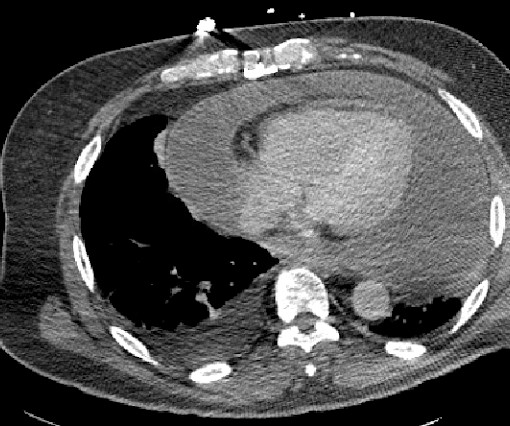
Dr. Smith's ECG Blog
MARCH 9, 2024
Written by Willy Frick A 67 year old man with a history of hypertension presented with three days of chest pain radiating to his back. Due to the chest pain radiating into the patient's back, the ER physician ordered CTA chest to rule out aortic dissection. He had associated nausea, vomiting, and dyspnea.
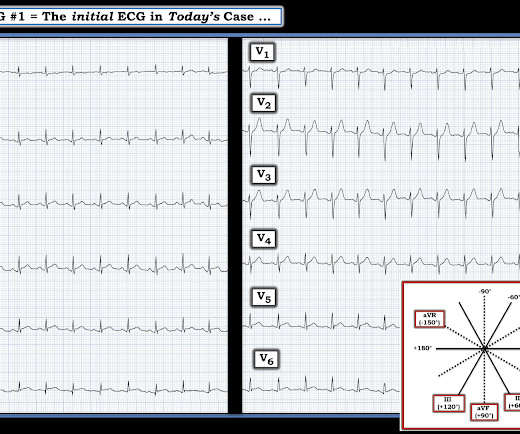
Dr. Smith's ECG Blog
APRIL 9, 2024
By Magnus Nossen This ECG is from a young man with no risk factors for CAD, he presented with chest pain. The patient is a young adult male with chest pain. The chest pain was described as pressure like and radiation to both arms and the jaw. How would you assess this ECG? What is your next step?
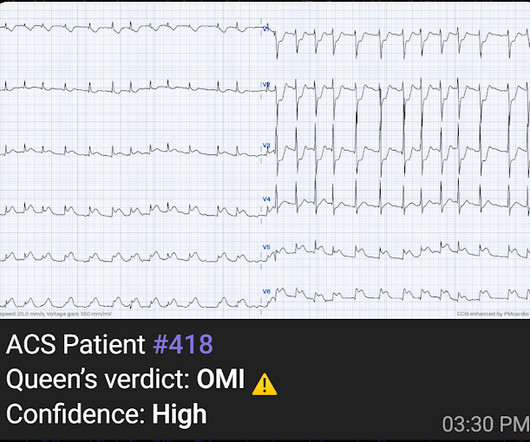
Dr. Smith's ECG Blog
JUNE 21, 2023
Sent by Magnus Nossen MD, written by Pendell Meyers A man in his 50s, previously healthy, developed acute chest pain. The primary care physician there evaluated this patient and deemed the chest pain to be due to gastrointestinal causes. The ECG was also interpreted as normal by the primary care physician.
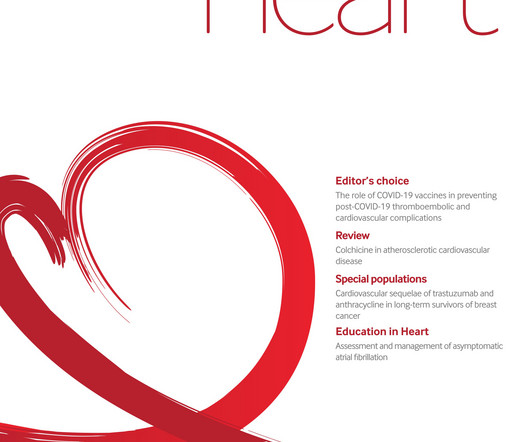
Heart BMJ
APRIL 15, 2024
Clinical introduction A man in his 40s with a history of hyperlipidaemia presented with intermittent, dull left-sided chest pain for 2 weeks that was not consistently exertional. Physical examination, an ECG, basic laboratories and a chest X-ray were unremarkable. He did not smoke or use alcohol or illicit drugs.

Dr. Smith's ECG Blog
SEPTEMBER 11, 2024
No Chest Pain, but somnolent. The fact that this is syncope makes give it a far lower pretest probability than chest pain, but it was really more than syncope, as the patient actually underwent CPR and had hypotension on arrival of EMS. Here is the ED ECG (a photo of the paper printout) What do you think?

American College of Cardiology
MARCH 12, 2024
The goal of the DISCHARGE trial was to evaluate computed tomography (CT) compared with invasive coronary angiography among patients with stable chest pain and intermediate pretest probability of obstructive coronary artery disease.
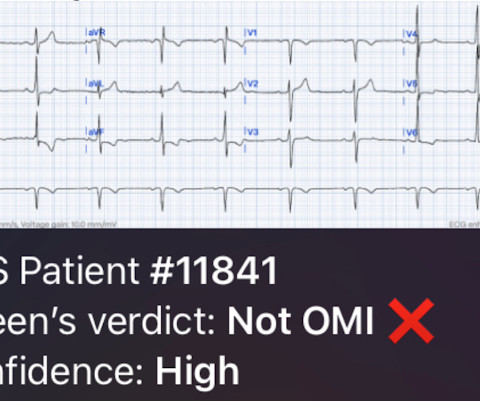
Dr. Smith's ECG Blog
NOVEMBER 27, 2023
Written by Jesse McLaren A 45 year old presented with two weeks of recurring non-exertional chest pain, now constant for an hour. Because of the ECG changes in a patient with chest pain, and with inferolateral hypokinesis on POCUS, the cath lab was activated. Below is old and then new ECG (old on top; new below).
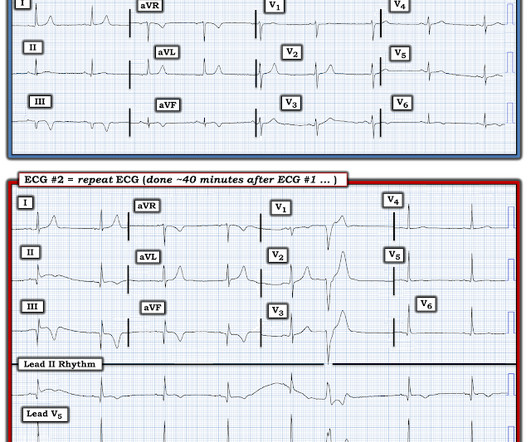
Dr. Smith's ECG Blog
AUGUST 10, 2023
Case submitted and written by Dr. Mazen El-Baba and Dr. Emily Austin, with edits from Jesse McLaren A 50 year-old patient presented to the Emergency Department with sudden onset chest pain that began 14-hours ago. The pain improved (6/10) but is persisting, which prompted him to visit the Emergency Department. What do you think?
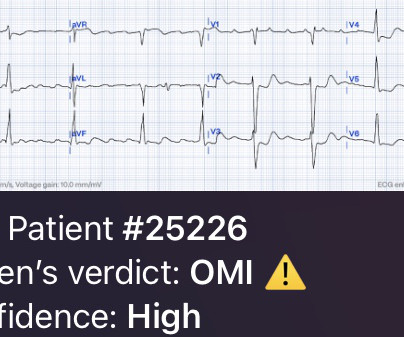
Dr. Smith's ECG Blog
FEBRUARY 9, 2024
Written by Jesse McLaren A 65 year old with a history of atrial flutter, CABG and end-stage renal disease on dialysis presented with 3 days of fluctuating chest pain, which was ongoing at triage. So a patient with high pretest probability (prior CABG with new chest pain), had new ECG changes showing posterior OMI.

Dr. Smith's ECG Blog
JUNE 13, 2024
Click here to sign up for Queen of Hearts Access Case A 58-year-old woman presented to the ED with burning chest pain that started 2-3 hours earlier while sitting on a porch swing. In any case, it is diagnostic of OMI in a chest pain patient. But there is also perhaps some STD in inferior leads -- this would support LAD.
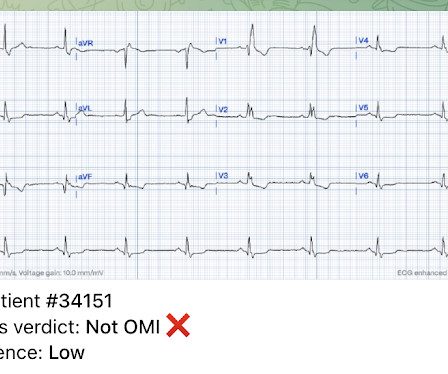
Dr. Smith's ECG Blog
APRIL 14, 2024
A 56 year old male with PMHx significant for hypertension had chest pain for several hours, then presented to the ED in the middle of the night. He reported chest pain that developed several hours prior to arrival and was 5/10 in intensity. The pain was located in the mid to left chest and developed after riding his bike.
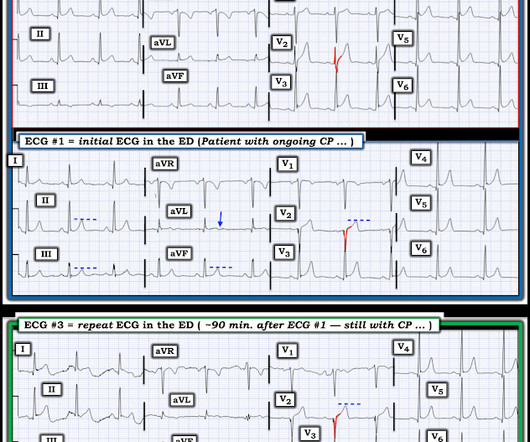
Dr. Smith's ECG Blog
DECEMBER 29, 2023
Written by Jesse McLaren A previously healthy 50 year-old presented with 24 hours of intermittent exertional chest pain, radiating to the arms and associated with shortness of breath. In a previously healthy patient with new and ongoing chest pain, this is concerning for acute occlusion of the first diagonal artery.

Dr. Smith's ECG Blog
JUNE 19, 2024
Case An 82 year old man with a history of hypertension presented to the ED with chest pain at 1211. He described his chest pain as pleuritic and reported that it started the day prior while swinging a golf club. His pain suddenly became much worse in the ED and he became acutely diaphoretic, dizzy, and hypotensive.

American College of Cardiology
FEBRUARY 1, 2024
Using computed tomography angiography (CTA) to evaluate stable chest pain patients was associated with a higher likelihood of revascularization when compared to other imaging modalities or no testing, according to a new study being presented at ACC’s Cardiovascular Summit 2024, taking place Feb. 1-3 in Washington, D.C.

Dr. Smith's ECG Blog
AUGUST 20, 2024
69 year old woman with chest pain.” The good news in this patient who presented with "chest pain" — is that even without access to a prior tracing — the initial ECG in Figure-1 should be interpreted as highly suspicious for acute OMI until we can prove otherwise. This ECG was emailed to me by Sam Ghali. Same in aVF.
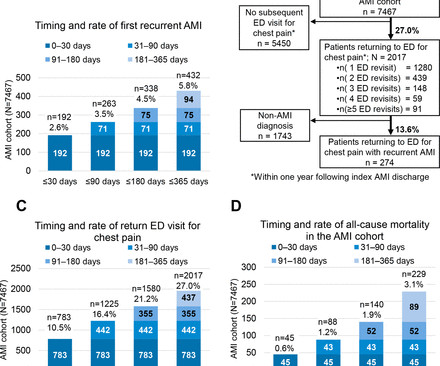
Open Heart
JUNE 29, 2023
Contemporary data on recurrent AMI and its association with return emergency department (ED) visits for chest pain are needed. Methods This Swedish retrospective cohort study linked patient-level data from six participating hospitals to four national registers to construct the Stockholm Area Chest Pain Cohort (SACPC).

Dr. Smith's ECG Blog
JULY 23, 2024
I was working at triage when the medics brought this patient who is 65 yo and has had chest pain for 12 hours. They recorded a prehospital ECG at 2112 and said that it was “normal”. It had already been crumpled up and put in the waste basket. So I uncrumpled it: What do you think?
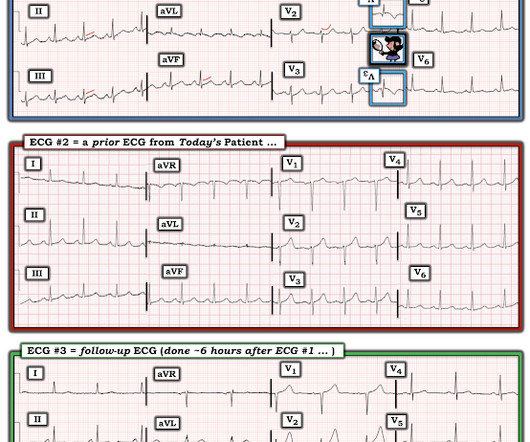
Dr. Smith's ECG Blog
FEBRUARY 6, 2023
Sent by anonymous, written by Pendell Meyers A man in his 60s presented with acute chest pain with diaphoresis. The Importance of the History: As noted above — the onset of chest pain in today's case was acute. He had received aspirin and nitroglycerin by EMS, with some improvement. His vitals were within normal limits.
Expert insights. Personalized for you.
We have resent the email to
Are you sure you want to cancel your subscriptions?

Let's personalize your content